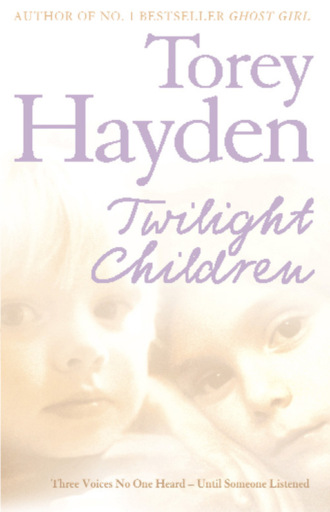
Полная версия
Twilight Children: Three Voices No One Heard – Until Someone Listened


Torey Hayden
Twilight Children

Contents
Cover
Title Page
Chapter One
Chapter Two
Chapter Three
Chapter Four
Chapter Five
Chapter Six
Chapter Seven
Chapter Eight
Chapter Nine
Chapter Ten
Chapter Eleven
Chapter Twelve
Chapter Thirteen
Chapter Fourteen
Chapter Fifteen
Chapter Sixteen
Chapter Seventeen
Chapter Eighteen
Chapter Nineteen
Chapter Twenty
Chapter Twenty-One
Chapter Twenty-Two
Chapter Twenty-Three
Chapter Twenty-Four
Chapter Twenty-Five
Chapter Twenty-Six
Chapter Twenty-Seven
Chapter Twenty-Eight
Chapter Twenty-Nine
Chapter Thirty
Chapter Thirty-One
Chapter Thirty-Two
Chapter Thirty-Three
Chapter Thirty-Four
Chapter Thirty-Five
Chapter Thirty-Six
Chapter Thirty-Seven
Chapter Thirty-Eight
Epilogue
Also by the Author
Copyright
About the Publisher
This book is based on the author’s experiences. In order to protect privacy, names, some identifying characteristics, dialogue, and details have been changed or reconstructed. Some characters are not based on any one person but are composite characters.
Chapter One
She was a small, fine-boned girl with a pointed pixie chin and unusually distinct cheekbones. Her hair was a soft black, straight and shoulder length, but it had been rather raffishly cut, as if perhaps done by another child. Her eyes, however, defined her face. Enormous, protruding slightly, and fluidly dark, like shadowed water, they overpowered her other features. She wasn’t what I would call a pretty girl, but she was striking in a faintly unreal way, so that when she lifted her hand to push hair back from her face, I half expected to see elfin ears.
“Hello,” I said and pulled out the chair at the table.
She hunched forward, hands down between her knees so that her chin was almost on the tabletop. Her eyes, however, remained on me. She smiled in a manner that was rather self-conscious, yet friendly enough.
“What’s your name?” I asked.
“Cassandra.”
Ah, a mythical name. It fit the fairy-tale looks.
“How old you are, Cassandra?”
“Nine.”
“My name’s Torey, and you and I are going to be working together each day.” I pulled out a chair adjacent to hers and sat down. “Can you tell me why you’ve come to the unit?”
Her dark eyes locked on mine, and for a moment or two she stared intently, as if she expected to find the answer there. Then she shook her head faintly. “No.”
“What about your mom? What did she tell you about why you were coming here?”
“I don’t remember.”
“Okay,” I said. I bent down and opened my box of materials. Taking out plain paper and a smaller cardboard box, I laid them on the table. “Most of the children I work with come to the unit because they have problems that make them feel bad. Sometimes, for example, they have problems in their family. Maybe someone in the family is really unhappy and it makes them do hurtful things. Maybe there’s been a divorce. Maybe there’s lots of fighting at home. For some of the children who come here, it’s other things. Maybe they’ve been in an accident or a really scary situation, or they’ve been very ill. Some have been treated or touched in a way that felt wrong, or people tried to make them keep secrets that hurt. And sometimes … sometimes kids don’t even know the reason they have troubles. They just feel angry or worried or scared all the time. So these are some of the reasons children come to the unit.”
Cassandra watched me with unusual intensity, as if she were really trying to take in what I was saying, trying to absorb it, almost. Nonetheless, there was an oddly blank quality to her stare, almost as if she were listening so carefully not for the content of what I was saying but rather because I was speaking to her in a foreign language she didn’t quite understand.
“Hearing about reasons for other children coming to the unit,” I said, “do you think any of those describe you?”
“I don’t know.”
“Okay. Well, I’ll share with you some of the things other people have told me about you. You can then say if you think they are true or not.
“Your mom, for instance, tells me that you had a scary thing happen to you when you were five. She says that she is divorced from your dad and that you and your sister were supposed to live with her and not see him. Then one day your dad came to school and had you get into his car, even though that was against the rules. He drove off with you and wouldn’t bring you back, and he wouldn’t phone your mom to tell her that you were safe, and he wouldn’t let you phone your mom. She says you were gone a long time – about two years – and during the time you were with your dad, some very scary things happened to you. Is that right?”
Cassandra nodded. Her demeanor was pleasant, cheerful even, as if I’d said no more than “Your mom says you are in third grade.”
“Your teacher tells me that you like school, that you can be very enthusiastic about what is happening in class. She says you are quite a smart girl and can do really well sometimes.”
Cassandra smiled.
“But she also tells me that at other times you have lots of problems. You can get very angry and have a hard time following the rules. Occasionally when you are at school, you get very upset and then you stop talking. Mrs. Baker says there are sometimes days and days when you don’t want to say anything to anyone, and this makes it difficult to do your work in class. But she tells me while these are bad problems, they aren’t the biggest problem. She says the biggest problem is that you very often don’t tell the truth. You make up stories about people that get them into trouble, and you often talk about things that aren’t really happening at all.”
I paused. “What do you think? Do you think these things have caused trouble for you?”
Cassandra shrugged. It came off as almost a comical gesture, the way she did it. She brought her shoulders way up and rolled her eyes in an exaggerated fashion that was tinged with tolerant good humor, as if to say, “Silly grown-ups, who make mountains out of molehills.”
“These are the reasons the grown-ups have given me, when I asked, ‘Why is Cassandra Ventura on the unit?’”
Cassandra rolled her eyes again, then looked up to the right, then up to the left, then back to the right.
“What do you think?” I asked. “Do these things seem like problems to you?”
“I don’t know.”
“I’m interested in your thoughts. There isn’t a wrong or right answer to my questions. We’re just exploring.”
“I don’t know,” she repeated.
“You don’t know?”
“I don’t remember.”
“You don’t remember what? If you do those things? If people think those are problems? Or you don’t remember what I just said?”
Again she shrugged and rolled her eyes.
I pushed one of the plain pieces of paper in front of Cassandra, then I opened the small box. Inside was an assortment of marking pens, pencils, and crayons. “I want you to draw me a picture of your family.”
She hesitated. “I’m not a very good draw-er.”
“That’s okay. They can just be stick figures, if you want. You can make them any way that’s easy for you.”
“Like bubbles? Instead of sticks, can I draw them round, like bubbles?”
“If that’s what you want.”
“Fish!” she said with sudden animation. “I draw really good fish. I figured out this way. Let me show you.” She picked up an orange crayon. “See? You make a circle. Then you draw a little triangle on one end with the point sticking against the circle and that’s the tail. See?” She made several more fish along the side of the paper. “Can I make them fish?”
“You decide,” I replied.
But she didn’t make fish. And she didn’t make stick figures. Instead, Cassandra dropped the crayon and took a pencil. She began to draw very small, very carefully proportioned people. First a man, then a girl, then a smaller girl, then a woman. A pause. Cassandra considered the picture. Then she added another figure next to the mother. This was a second man. Then she added a third man. Another pause.
Everything thus far had been done in pencil. Indeed, she’d chosen a very sharp, hard-lead pencil and so the drawings were quite faint. She then put the pencil down and reached over for the box, pulling it closer. Looking through, she picked out different crayons and set about placing her family in a pleasant scene of grass, blue sky, and bright sunshine. She worked carefully, coloring in the grass after drawing the lines and then the sky. She assiduously avoided coloring over the orange fish so that it looked almost as if they were balloons in the air. She pressed hard when making the sun, turning it waxy yellow, many of the rays extending out over the crayoned blue of the sky.
While Cassandra had been careful not to color over her fish at the edge of the paper, she had had no such compunctions about coloring over the family. They were hardly visible through the blue she’d used for the sky.
“There,” she said, then paused to regard the picture. “No, wait.” She reached out and took up a black magic marker. Carefully she penned in a smiling face on the sun. “That’s better. That’s a happy picture now, isn’t it?” Then she continued with the black marker and drew a strange little blobby shape in the sky not far from the sun. It had three protrusions, making it look rather like a clover leaf without the stem.
“You’ve worked hard on that. Can you tell me about it? Who are these people in the family?”
“Welllll,” she said in a slow, drawn-out voice, “that’s my dad.” She pointed to the first faint figure. “That’s my sister Magdalena. And that’s my sister Mona. And that’s my mom. And that’s Daddy David. And that’s Uncle Beck.”
“And where are you in this picture?” I asked.
“I’m not in this picture. Am I supposed to be in this picture? I thought you said you wanted a picture of my family.”
I nodded.
“You wanted me in the family?” she asked.
“Well, if you wanted to draw everyone in your family, it might include you, mightn’t it? … but then again … however you see it, that’s good. There isn’t a right or wrong way of doing it.”
“Everyone? You wanted everyone? I didn’t know you said everyone. I didn’t know you meant everyone.”
Cassandra reached over and picked out an assortment of crayons – red, yellow, blue, green. Down in the right-hand corner of the picture she began to draw several small snakes, all with smiley faces. She made about ten of them of different sizes.
“This is becoming quite an intricate picture,” I said. “Can you tell me about these?”
“This is Mother Snake and this is Father Snake and these are the kid snakes. And this is Minister Snake. And this is Cowboy Snake. And this is Fairy Snake. They’re my brothers and sisters, these ones. He’s my brother and he’s my brother and this one’s my sister.”
“Ah,” I said. “Your mom only told me about your sisters Mona and Magdalena.”
“These are my other brothers. In my other family. From when I was abducted. I lived in a whole other family then, and these are my brothers and sisters from there. I called them ‘Minister’ and ‘Cowboy’ and ‘Fairy’ because that’s how they liked to dress up. Well, not him. He really was a minister. He was a grown-up. Like seventeen, I think. But Cowboy and Fairy were my age. Well, Fairy was younger. She was three. I took care of her.”
“I see. Your mother didn’t mention your other family.”
Cassandra grinned then. It was an openly saucy expression. “Maybe she doesn’t know.”
Or maybe I don’t know, I was thinking. There was something too playful about her behavior, making it feel manipulative to me. I was getting a sense of smoke and mirrors about Cassandra, that she was astute at giving what she surmised I wanted so that I never noticed what wasn’t being offered.
“And that’s me, there,” she said and pointed to the clover-shaped blob in the sky.
“Ah,” I said, “so you are in the picture now?”
“Yup.” She looked up at me and smiled. “But I’m up there ’cause I’m an alien.”
Chapter Two
I’d been working on the unit almost two years. Feeling frustration with the attitude of the administration in Washington toward special education and foreseeing the inevitable cutbacks and job losses that would result from administration policy changes, I had decided to take a break from teaching. Some years earlier, I’d completed my psychology credentials, so this seemed the right time to move in that direction. My intention had been to join a small clinic where a friend of mine worked. It was located in a city I had lived in previously, a city I knew and loved well and where I already had a good social network. What had attracted me most, however, was a chance to work with the clinic’s director. He not only had a formidable reputation in child psychiatry, which was reason enough to want to learn from him, but he was also a skilled administrator, known for his creative thinking. Breaking free from the often restrictive attitudes of psychiatry, he had sought to set up the clinic with a more holistic approach, drawing together professionals from several allied fields – child psychology, psychiatry, pediatrics, social work – to work together in a broad, cross-disciplinary manner. This ability to “think outside the box” appealed to me greatly.
How I’d left the small town where I had been teaching with the intention of taking up a position in that wealthy, well-funded, broad-minded private clinic and ended up instead working in the claustrophobic world of a closed psychiatric crisis and assessment unit for children in a metropolitan general hospital was somewhat of a mystery even to me. It had involved one of those encounters one can only write off later as “fate,” when a colleague of a colleague contacted me late one Sunday afternoon, saying something about being familiar with my former project in elective mutism and would I be willing to give an in-service to staff at the hospital. While on the unit to do the in-service, I found out they were desperately looking for a specialist in psychologically based language problems. I was not such a specialist, but I was free for a few months, since times had not quite coordinated between the end of the school year and the opening of the position at the clinic. I said if they were interested, I’d be willing to give it my best shot. They were and I did. And months zoomed by. The position at the clinic came and went and I remained at the hospital.
It was a good choice. No doubt the clinic would also have suited me well, and I still had occasional idle dreams of switching over at some later date, but I loved the gritty, front-line feel of working in a hospital. We were a shortterm facility, designed primarily for diagnosis and assessment, as well as acute crisis intervention, and as a county-funded institution, many of the cases referred to us came from the poor under-belly of society. The continual struggles for enough time, enough money, enough choices never went away, lending a certain frisson to the work and provoking among the staff an attitude akin to that of comrades-in-arms in a MASH unit. Like a good political debate, this kind of edgy atmosphere stimulated me. I enjoyed, too, the flexibility of my position, which allowed me to continue liaising with many of my patients long after they had left the hospital unit and returned to their homes and schools, and I enjoyed being a “language specialist,” of seeing the many variations of one presenting problem.
Which is how Cassandra came my way.
In the beginning Cassandra Ventura’s life had looked promising. Her father was a security guard. Her mother had been a secretary but gave up work when Cassandra’s elder sister, Magdalena, came along. During those years, the family exuded the American dream. They worked hard, were committed members of their church, helped out in community activities. Dad was a regular on the company bowling team. Mom baked cakes that won prizes and sewed enviably well, providing the two girls with elaborate costumes at Halloween, new dresses at Easter, matching outfits for the school pictures.
Behind closed doors, however, it was a very different scene, one of drug problems and domestic violence. Mr. Ventura claimed never to have abused the children until that final incident. Before that point, it had been only his wife who had suffered the cruel put-downs, the beatings, the dishes smashed over her head. But then on that night, six-year-old Magdalena had tried to intervene, getting physically between her arguing parents. Mr. Ventura swung out at her, meaning only to push her aside. She fell and was knocked unconscious. That proved the breaking point for Mrs. Ventura. She could no longer keep up the pretense of being a happy family. Taking the girls, she fled to a women’s refuge. The next day she went to the police.
It unraveled swiftly from there. As well as the domestic abuse, Mrs. Ventura also revealed her husband had long-term drug problems and had been using his position as a security guard to procure a regular supply of cocaine. The criminal trial that followed was ugly and rancorous and made worse because it required testimony not only from his wife but also Magdalena. Mr. Ventura was jailed for eighteen months.
Mrs. Ventura rebuilt her life with rather disconcerting speed. All within the space of time her husband was in jail, she managed to file for divorce; meet and move in with another man, whose name was David Navarro; relocate to a new community about an hour’s drive from the city; and give birth to a third daughter, Mona.
Cassandra had been three at the time of her father’s imprisonment. Two years later, when she was in kindergarten, she came out of school to find a car waiting for her. When the man in the driver’s seat said he was Daddy, she hesitated. She didn’t actually remember her natural father well, so she didn’t know if this was him or not. When he tried to call her over, she replied that she needed to wait until Magdalena came out. He said, “I have some of your old toys here. I thought you might want them.” So she went to see.
When Magdalena came out from her third-grade class, there was no sign of her younger sister. Her mother was called. The police were called. Nothing. No trace. Cassandra had disappeared.
The Navarros’ efforts to find Cassandra were unrelenting. Police bulletins, news reports, searches over several states, posters in the local grocery store, on the side of milk cartons, efforts through Mr. Ventura’s parole officer – everything anyone could think of was tried in an effort to find out what happened that afternoon – but nothing turned up. It was as if Cassandra and her father had, as the old cliché goes, simply vanished into thin air.
Twenty-six months passed without any word of Cassandra’s whereabouts. Then three states away, a young man working in a 7-Eleven convenience store discovered a small girl in the alley behind the store going through their garbage. Suspicious that she was there to steal something, he gave chase when she tried to run away, and caught her. When she wouldn’t speak to him, wouldn’t answer his questions about her name or where she lived, he called the manager. The manager realized immediately that the girl was too young to be alone in such a place at that time of day, and he was concerned about her unkempt appearance; so he called the police. It was Cassandra.
No one ever knew precisely what had happened to her during those twenty-six months. Cassandra was totally mute for the first weeks after her return. Her father, when found, was in a drug-addled stupor, and he seemed incapable of giving much information beyond indicating the motive behind the abduction had been revenge against his ex-wife. “I wanted to make her suffer for what she’d done” was his only real explanation.
Cassandra had been not quite six when she was abducted and was now approaching eight. She was very dirty and suffering from malnutrition, giving the impression she had spent at least part of the time living rough or in very poor conditions. No one knew whether this was in the company of her father or others, because her father gave a muddled, inconsistent picture and Cassandra said nothing. Even when she did begin to speak again, she usually refused to talk about the abduction. The few things she did say turned out to be mostly lies.
The longed-for homecoming proved to be nothing like Cassandra’s mother had dreamt about for so long. In place of the cheerful, loving daughter who had been abducted that autumn afternoon, she welcomed home a wary, mute stranger.
Cassandra found it impossible to settle back into her former life, which, in fact, was not her “old life” at all, but rather a completely different one from what she’d been living before the abduction. She hated her stepfather and wouldn’t tolerate him in the room. She refused to talk to him or even look at him. She fought constantly with Magdalena and did many small, nasty vengeful things to her. With her new sister, Mona, she was so spiteful and short-tempered that her mother didn’t dare leave the two of them alone together.
Cassandra startled easily, was prone to unexpected tantrums, suffered horrific nightmares, and alternated between shouting at everyone and not speaking at all. She lied constantly, stole from everyone in the family, and had chaotic eating problems, tending to hoard and hide food, or else taking too much, consuming it too fast, and vomiting it back up, occasionally while still at the table. She also had digestive problems and was plagued by many other minor illnesses associated with a compromised immune system.
In addition, it appeared Cassandra had not attended school at all during the time she was gone. Indications when she was in kindergarten were that Cassandra, like her elder sister, would be an able student. Old enough to be in second grade when she returned, she was now behind in everything and could neither read nor do basic adding and subtracting.
Cassandra’s mother and stepfather attempted to deal with the situation as appropriately as they could. Her parents decided to restart Cassandra’s education from the beginning, so she was placed in first grade, a year below where she should have been for her age. This still left plenty of catching up, as the academic year was well under way when she returned, so she was also given extensive resource help. To deal with the psychological trauma of the abduction, Cassandra had individual therapy with a child psychologist for twelve weeks, which was the length of time covered by the Navarros’ insurance.
And Cassandra did start to recover. She began to speak reliably again. First it was at home and then, more slowly, at school, although she could still be oddly unpredictable and sometimes went silent for hours and occasionally even days. She was making reasonable academic progress and generally keeping up with her class. At home she was still difficult and prone to tantrums, but the family felt this was improving, too.







